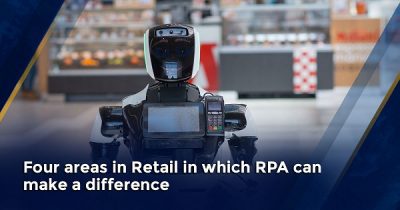
Robotic Process Automation can play a crucial role in transforming the retail industry in areas such as business and data analytics, store planning and inventory management, customer support, and supply chain management.
Retail, like every other industry, is undergoing a transformation to streamline its workflow, remain competitive, and deliver superior customer experiences. It is leveraging digital technology to remain relevant and attractive to the new-age digitally-savvy customers. The retail industry is facing a challenge of sorts in terms of changing customer expectations and the need to provide high user satisfaction. Robotic Process Automation or RPA is one such technology that can offer an optimum solution to the retail industry. RPA in retail can be leveraged to automate the workflow comprising a number of repetitive tasks in customer engagement, inventory management, bill generation, loyalty scheme management, and business reporting. Even statistics predict a significant role of robotic process automation in retail by touching USD 6.10 billion by 2027 at a CAGR of 24.9% (Source: Fortune Business Insights.)
The impact of RPA in retail in improving the auditability of its workflow and garnering better data analytics is increasingly being looked at to improve scalability and customer experience, and reduce cost. The four areas in retail where RPA can make a significant difference are:
How RPA can impact retail in four areas
Today, retailers have to operate on multiple levels to reach the customers on-the-go. The brick-and-mortar stores are complemented with the digital interfaces of e-commerce stores that can be viewed across device platforms. To ensure the convergence of real and virtual works seamlessly, RPA, along with a robust retail testing strategy should play a crucial role. The four areas where RPA can address the challenges of the retail industry are:
#1 Business and data analytics: Retail decisions, namely related to product introductions, trade promotions, and churn rate are heavily dependent on analytics. Here, RPA algorithms process a humungous set of data obtained from multiple sources in real-time to get a comprehensive and incisive picture of customers and their preferences about products or specific aspects of a product. RPA can predict the changing market trends and give retailers the insight to craft a risk mitigation strategy like optimizing stocks or incorporating retail test automation in the value chain, among others. The reports generated by RPA after analyzing real-time data can throw light on the hidden trends, customer dissatisfaction, and the steps to be taken to retain them.
#2 Store planning and inventory management: One of the high selling points to increase sales is to arrange the retail store according to customer preferences. This store planning can help customers to complete the purchase early without hassle. However, in modern retail where multiple factors drive or affect sales, a technology like RPA can help to analyze the nuances of customer behavior and offer deep insights. These can help retailers to refurbish their stores to fit customer expectations, enhance customer experience, and boost profits.
#3 Customer support: Customer support is at the core of any retail strategy. To provide 24 x 7 customer support, many retailers are opting for automated bots. These bots can respond to a large number of customer queries such as tracking orders and payments or providing updates on product launches, discounts, or price change, among others. However, these bots need to be put through a comprehensive retail software testing process before being implemented to ensure they function seamlessly.
#4 Supply chain management: The successful operation of any retail store depends on the management of its supply chain. So, between receiving products from vendors and delivering them to the customers, there are several processes involved. These include inventory monitoring, shipment, and tracking order status, among others. With RPA, the logistics process can be automated leading to better collaboration between suppliers, vendors, distributors, and customers. It can lead to cost optimization and reduction in waste thereby offering better levels of customer satisfaction.
Conclusion
The retail industry can leverage the RPA technology to better organize the activities of their value chain. It helps to eliminate the repetitive manual processes and associated errors leading to customer satisfaction. In a competitive business landscape, the application of RPA and retail application testing can deliver better profitability and competitiveness.
The post Four areas in Retail in which RPA can make a difference appeared first on NASSCOM Community |The Official Community of Indian IT Industry.









